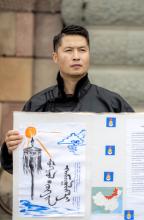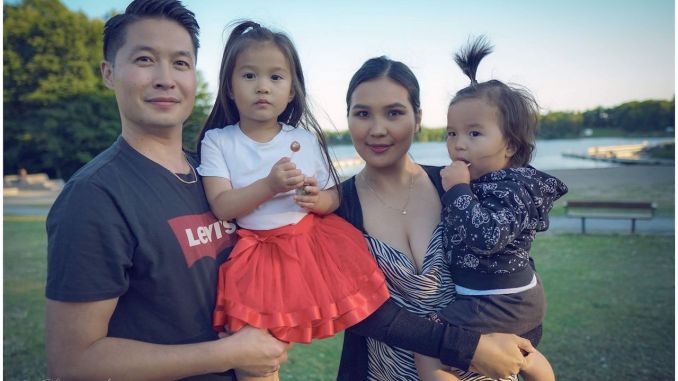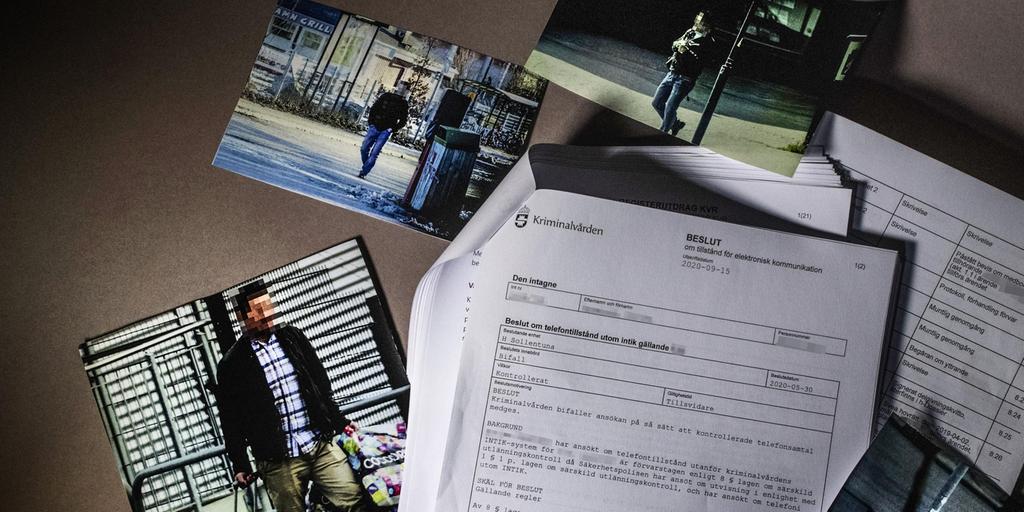Swedish deportation of Inner Mongolian activist to China imminent
Update. On 27 January 2021 the higher migration court denied Baolige's request for a hearing on issuing a stay in the execution of the deportation order. With that, the legal process in Sweden has now been exhausted, and there are no further steps that can be taken. The last chance for Baolige now stands with the European Court on Human Rights in Strasbourg.
Update: On 25 January 2021 the family of renowned Swedish diplomat Raoul Wallenberg issued a public statement of support for Baolige, and calls for the Swedish government to intervene to protect him, and to honor the "deeply humanitarian spirit that moved Raoul Wallenberg to action in Hungary in 1944, when he - aided by his Swedish colleagues and diplomats from other neutral countries - sheltered over one hundred thousand persecuted Jews during one of the darkest chapters of human history."
Update: On 4 February 2021 the Swedish parliament will hold a debate on the migration board's policy, the situation in Inner Mongolia, and, indirectly, the situation for Baolige.
**
Amidst a growing outpour of support from academics, lawyers, NGOs, and private citizens, in Sweden and around the world, concerning the fate of Chinese national and Mongolian rights activist Baolige, and his imminent deportation from Sweden to China, Safeguard Defenders takes a deep-dive into the unfolding situation.
This all occurs against a backdrop of a battle over the fate of a Swedish citizen stuck in a Polish jail that China wants extradited, continued record-poor relations between Sweden and China, the imprisonment and disappearance of a Swedish bookseller, and China's expanding crackdown against the Mongolian ethnic minority.
 Baolige Wurina came to Sweden more than ten years ago as a 23-year-old and has made a life in suburban Stockholm with his Mongolian wife Uurtsaikh Batjargal and two children (unlike Baolige, Mongolian, not Chinese). Upon assimilating in Sweden, learning the language, and witnessing how China has harshened its treatment of ethnic minorities, and how more recently, China has started tightening its grip over the dwindling Mongolian ethnic group in Inner Mongolia, he has become not only more politically active, but a leader, often captured on video at demonstrations, holding public speeches, and partaking in marches concerning ethnic minority rights, often aligned with the small Uighur and Tibetan group in Sweden.
Baolige Wurina came to Sweden more than ten years ago as a 23-year-old and has made a life in suburban Stockholm with his Mongolian wife Uurtsaikh Batjargal and two children (unlike Baolige, Mongolian, not Chinese). Upon assimilating in Sweden, learning the language, and witnessing how China has harshened its treatment of ethnic minorities, and how more recently, China has started tightening its grip over the dwindling Mongolian ethnic group in Inner Mongolia, he has become not only more politically active, but a leader, often captured on video at demonstrations, holding public speeches, and partaking in marches concerning ethnic minority rights, often aligned with the small Uighur and Tibetan group in Sweden.
But Sweden never granted him that asylum and has now decided that Baolige must be deported back to China, despite a growing chorus of criticism from both domestic media, international media, and members of parliament in Sweden.
This is despite the significant risk that Baolige will face certain detention, very likely arrest, and likely torture if returned to China.
Baolige's wife and two children are Mongolian, not Chinese, and their imminent deportation will also mean that a family of nine years, with children born and raised in Sweden, will be torn apart.
Baolige and the decision to expel him back to China
Amidst growing scrutiny of this case in both Swedish media and among a few members of parliament, and a recent Newsweek article, have forced the migration board, the government authority that first took the decision to deny them asylum, to defend itself and its actions in a hopelessly naïve and misinformed opinion piece.

The migration board, and later the court and the higher court, has seemingly taken its decision based upon its conclusion that Baolige does not face a significant risk of persecution should he be returned to China, and that therefore the family does not need to be split up, and can simply reunite in Mongolia after their return.
This is despite, as reported in media:
…he is already on the radar of the Chinese authorities, [has been] confirmed by the fact that police have been visiting his family members in Inner Mongolia, threatening his mother with consequences if their son continue to carry out any kind of activism abroad.
His wife Uurtsaikh Batjargal told me about those visits when we talked to each other over the phone earlier this week. She also said that they provided the Migration Court with audio files confirming the visits by the police, together with other material depicting the worsening situation for ethnic Mongols in China in general.
The migration board, in its defensive opinion piece, claims that its analysis of developments in China and elsewhere is strong and that due considerations have been taken. However, in the very same piece, the author mistakenly refers to Inner Mongolia as a province, rather than a region, and claims it, by referring to its official name, as autonomous, without qualification or quotation marks. They also claim that their analysis is based on a variety of reports, but the developments in Inner Mongolia is so recent that few to none exist, and Sweden's foreign ministry has yet to even make a statement of any kind on the situation. In fact, any reports that do exist point out the rapidly deteriorating situation. It is unlikely that any such reports exist and have been used [unless outdated reports before the deterioration begun have been used].
It should be noted that the migration board took its initial decision to deny asylum back in 2014, and have stuck to their position without any change whatsoever, despite the significant changes both in China but also to Baolige and his public role as an activist in Sweden, and revelations on the extent of refugee espionage carried out by China in Sweden and exposed in court. The higher court, when deciding to deny the request for a stay in the execution of the order just this winter – Baolige's last chance - took a decision swiftly and cannot possibly have reviewed material on the rapid changes in Inner Mongolia that have occurred during this process. The board and court seem intent on ensuring that he is expelled per the first initial decision taken years and years ago, no matter what changes occur.
It is thus with a combination of lack of knowledge, and a glaring level of ignorance, as the opinion piece highlights, that the migration board has decided that this well-known political activist, who is involved in an issue that the Chinese state and Communist Party considers its own greatest threat – ethnic minority rights and threats to "national unity" – can be returned without there being any serious threat against him.
The basis on which the decision has been taken, as far as the situation in Inner Mongolia goes, is, at best, outdated. However, far worse, the court entirely misses key developments that other verdicts in Sweden have recently shown, and which has been echoed in numerous news articles on similar issues, namely the extent to which the Chinese state is monitoring and taking actions against refugees outside of China.
Chinese espionage against refugees in Sweden
Sweden stands out in the West as it has had two convictions of refugee espionage conducted by China's Ministry of State Security (MSS), both targeting ethnic minority groups in Stockholm, where Baolige, and his public activism, is based. Such convictions are exceedingly rare. The latest of these convictions, against a Tibetan man, turned spy for China's MSS, written about in detail by Safeguard Defenders, exposed with clarity the length to which the MSS and the Chinese embassy in Stockholm go to to monitor the activities even of non-political activists. Outside of espionage by the MSS, the Chinese embassy in detail monitors what individual journalists write in Swedish media about China and directly contact journalists they believe are not writing about China in a proper way. It also lashes out publically against publications.
Credit: Göteborgs-Posten
The belief, with MSS-run espionage operations and an activist embassy that seeks to monitor all aspects of "China in Sweden," is not aware, in some detail, about Baolige's activism in Sweden, is beyond deniability. The question is, what can be learned about what happens to those that are known to be involved in such activism upon their return to China?
Even disregarding the situation in Inner Mongolia and his Mongolian ethnicity, the answer should, especially considering the court verdicts on refugee espionage, be straight forward; no public human rights activist can safely be returned to China. They know who he is, they monitor him, and they will take "appropriate" action upon his return.
Deterioration in Inner Mongolia and growing threats to Baolige and other defenders
 However, his ethnicity adds another layer of danger. The last few years have seen an explosion in coverage on not only the situation in Xinjiang – now classified by the United States, as well as other individual parliamentary committees, as a genocide - but also on how China is chasing those from Xinjiang outside of China, forcing their return, tricking them into returning, and forcing their extradition or deportation. Even relatives and those not politically involved at all are not spared, as a long expose in the Guardian about a Uighur in France showed.
However, his ethnicity adds another layer of danger. The last few years have seen an explosion in coverage on not only the situation in Xinjiang – now classified by the United States, as well as other individual parliamentary committees, as a genocide - but also on how China is chasing those from Xinjiang outside of China, forcing their return, tricking them into returning, and forcing their extradition or deportation. Even relatives and those not politically involved at all are not spared, as a long expose in the Guardian about a Uighur in France showed.
The few reports that do exist, such as the annual reports from the U.S. Congressional-Executive Committee on China (CECC), shows clearly that political persecution is also ongoing against Mongolians in Inner Mongolia, with rights defenders, artists, and their lawyers detained, arrested, or otherwise persecuted. Information from the Southern Mongolia Human Rights Centre (SMHRC) has also clearly shown how such persecution has greatly expanded in scope since the deterioration in Inner Mongolia began – despite the very limited information that is available, partly because media and NGOs are forbidden from accessing the areas in question.
Perhaps the migration court needs to ask themselves, why are such travel restrictions now in place? While thinking about that, perhaps also remember that such restrictions have previously been used in Tibet and Xinjiang, to control information about the changes in those areas.

During this extensive period that Baolige's asylum request has been ongoing, China has moved its positions on ethnic minority control, and in some cases, genocide, forward. Despite lack of information, there are reports on what is going on in Inner Mongolia, which indicates the scale of the crackdown, but the court is seemingly set against taking such into consideration.
China has also expanded the legal basis for persecution, most recently with a new addition to its criminal law, making "spreading rumours" illegal (article 291(1)), in addition to already being a crime according to article 105 if it relates to national security.
This is in addition to article 103 (splittism), which outlaws activities that threaten national unity and which is used in particular against rights defenders involved in what can be considered ethnic minority issues. Despite appearing similar on paper as inciting subversion, inciting splittism usually carried far harsher sentences, as these issues are considered more of an existential threat to the CCP than regular rights defence activities.
Last chance for Baolige
On January 20 a coalition of NGOs from across Europe, Asia and North America sent an urgent appeal to the court in Sweden to halt the deportation order, pending a more comprehensive review of the situation in Inner Mongolia. As the highest instance has taken its decision, it is now too late for any additional court reviews, and no longer possible to correct the prosecutor’s lack of information about how Chinese police targets those active outside of China upon their return. It also means it’s too late to show how such deportation will violate Sweden’s legally binding commitments to the European Convention on Human Rights (ECHR) that the court now stands in contempt.
The appeal letter:
- What we know is that Baolige is a well-known activist, and we know that the Chinese side knows this.
- We know activists face persecution in China.
- We know the treatment of them stands in violation of both ECHR article 3 (torture and mistreatment) and article 6 (right to a fair trial).
- We know Sweden has, by its Supreme Court, denied extradition of a Chinese citizen to China because of the ECHR (in particular articles 3 and 6).
- We know that ethnic minorities, and any activism on their behalf, is treated particularly harshly in China.
- We know, from its own evidence, that the migration board has not updated its view on Baolige, or Inner Mongolia, since 2014, and we know that their analysis of the situation and knowledge of it is both outdated and based on ignorance, as shown in their very own opinion piece.
- We know that there is a significant risk that Baolige will be detained by police upon arrival in China, and equally high risk he will be arrested and that it is highly unlikely that he can be reunited with his family in Mongolia or leave China at all.
The migration court must issue a temporary stay to the execution of his deportation, pending a proper analysis by the migration board on the situation in Inner Mongolia, and the case must be brought to the European Court on Human Rights to ensure that future considerations by the migration court do not violate its commitment to the ECHR in the manner which has been done in its deliberations on the case of Baolige.
